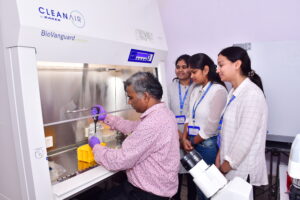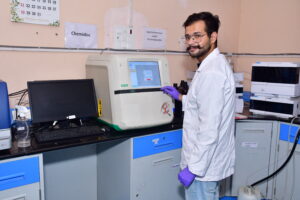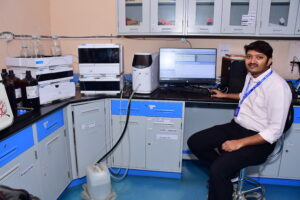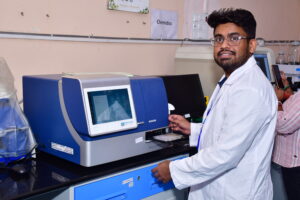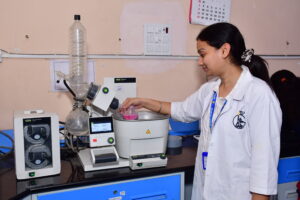Department of Pharmacology and Toxicology
Department of Pharmacology and Toxicology at NIPER, Hajipur was established in 2018. The department is research-oriented and offering training to postgraduate and PhD students to fulfil the national and international demand of trained pharmacologist. Since its inception, the department aspires to become a recognized Centre for the pharmacological and toxicological screening of products from various sources. The recent development is in the same line by the addition of a state of art laboratory with various instruments to perform basic to advance research. The department has good coordination with other research institutes namely Mahavir Cancer Institute and Research Centre, Patna, Rajendra Memorial Research Institute of Medical Sciences, Patna (previous mentor institute) and Central Drug Research Institute, Lucknow for various projects and study-related activities.
Program: MS. Pharm (Pharmacology and Toxicology) The duration of the postgraduate course is of 2 years spread over of 4 semesters, out of which the last two semesters are exclusively dedicated for the research project. The course curriculum is designed to cover the areas of the fundamental and regulatory aspect of safety, and efficacy of pharmaceutical products from herbal and synthetic sources. Subjects in first semester: Pathophysiology, General and Experimental Pharmacology, Chemotherapy of Parasitic and Microbial Infections, Separation Techniques, Biopharmaceutics and Pharmacokinetics, Biotechnology in Pharmaceutical Sciences, Biostatistics and Fundamentals of Intellectual Property (IP) and Technology Management.
Subjects in Second semester: Drug Metabolism, Pharmacological Screening and Assays, CNS and Respiratory Pharmacology, Autonomic, CVS, Blood, Renal and GI Pharmacology, Autacoid and Endocrine Pharmacology, Clinical Pharmacology, Regulatory Toxicology, Chemotherapy, Immunopharmacology.
Project work in third and fourth semester: Though the research training starts from the first semester onwards, the real research experience is imparted to students by the experienced faculty of NIPER, Hajipur and nearby reputed scientists of other national institutes in the second year. Students are given the freedom to select the research area while the emphasis is given to work in the area of expertise of the faculty.
Research Project at Dept. of Pharmacology and Toxicology:
Organoid cultures from normal and cancer-prone human tissues: This project will focus on patient-derived cancer organoids as predictors of treatment response. Our in house developed cancer organoids will be used to compare the efficacy of standard-of-care and targeted combination treatments with clinical patient response. Further, a detailed epigenetics studied will be undertaken to understand the mechanisms behind chemo-/radioresistant tumors, and to develop the product to reverse tumor resistance n cancer treatment.
Restoring temzolomide sensitivity in glioblastoma: This is NIPER common research project aim to restore temzolomide sensitivity in glioblastoma and to preparation of anti-EPhA2 coated formulation of temozolomide and methylguanine methyltransferase (MGMT) inhibitors for targeted therapy. We have achieved initial success in insilico screening of compounds (Sirt1 activator) and testing a series of compound on temozolomide resistance cell-lines. Further in this project NIPER Hajipur aims to characterize MGMT protein using LC-HRMS, preparing of anti-EPhA2 coated formulation of temozolomide and MGMT inhibitors for targeted therapy and to conduct the pharmacokinetic study of the formulation.
In collaboration with biotechnology, dept of pharmacology and toxicology is developing pharmacologic, genetic and stem cell-based interventions for reversing mood and cognitive deficits in aging, Alzheimer’s disease, and diabetes or chemotherapy-induced brain disorders. This project focuses primarily on the functional and mechanistic aspects of stem cell biology and the potential of different types of stem cells for therapeutic applications.
Further, in collaboration pharmacy practice and analytical department, and IGIMS Patna, we aim to identify the simple, cost-effective, and easy-to-use biomarkers for detection, prognosis, and therapeutic assessment of neurological disorders, cancer, and diabetes.
Research in pharmacology and toxicology dept focuses on determining the epigenetic changes in diabetes and diabetic complications, and cardiovascular diseases, and determining whether these changes are sex-linked
Established Research labs at Dept. of Pharmacology and Toxicology:
Rodent Behaviour Laboratory: The small rodent Behaviour Laboratory at Dept. of Pharmacology and Toxicology, NIPER Hajipur is equipped with facilities and expertise necessary to enable investigators to quantitatively assess a broad range of rodent behaviour like spatial learning and memory, and object and place recognition memory. The facilities at NIPER Hajipur has established a develop and validate novel paradigms to improve translation of preclinical behavioural results to clinically relevant outcome measures and create better tools for biobehavioural research.
Tissue culture and cells harvesting: The The Tissue Culture Lab provides dedicated labs and resource with instrumentation and expertise to support the establishment and maintenance of cell cultures as invitro models for a variety of tissues at of Dept. of Pharmacology and Toxicology. The resource is comprised of laboratory spaces that are maintained exclusively for cell culture work. There are two smaller laboratories that each have two biological safety cabinets, water-jacketed, tissue culture incubators, inverted microscopes, clinical centrifuges, water baths, and refrigerator/freezers. A larger facility has essentially the same equipment but with three biological safety cabinets and a larger number of incubators.
Rodent Stereotaxic Surgery and cell transpiration: Dept. of Pharmacology and Toxicology is equipped with Stereotactic neurosurgery technique used in pre-clinical research to engraft a needle or electrode at a pre-defined location in the rodent’s.
Currently Grant Funded at Dept. of Pharmacology and Toxicology:
1. Principal Investigator, Dr. Vipan Parihar: Endocannabinoids for cognitive aging and neurodegeneration, funded by Dept of Science and Technology, SERB Start-up Research Grant. Total amount Rs 32 Lakhs. Year 2022-2024.. This project focused on the analysing age-related modifications of the CSF proteome, from subjects with AD and amnestic mild cognitive impairment.
2. Principal Investigator, Dr. Vipan Parihar: “Efficient process development strategies for prevalent “Rare disease” drugs”. Funded by Dept of Science and Technology, and Dept of Pharmaceutical Govt of India. Research project: Rare disease multicentric program grant. Total amount funded: Rs 70 Lakh.
Faculty
1. Dr. Nitesh Kumar, Assistant Professor and Head
